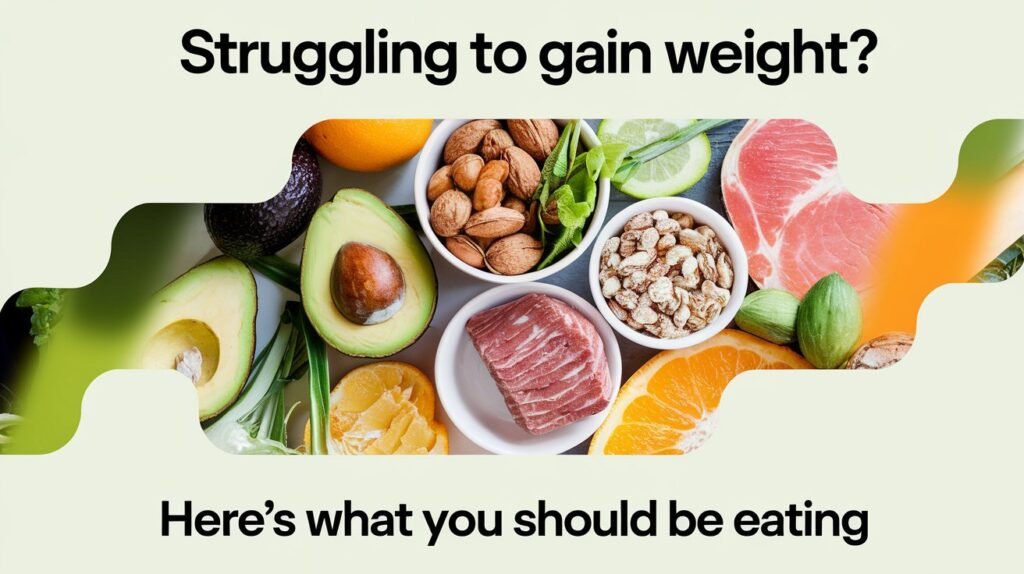If you’re struggling to gain weight, you’re not alone. Many people focus on losing weight, but there’s a significant group of individuals who want to put on a few extra pounds for better health, muscle mass, or just to feel more energized. Gaining weight may seem as simple as eating more, but it involves more than just increasing your caloric intake. Choosing the right foods is essential to ensure that you gain weight in a healthy and sustainable way.
Here’s what you should know about gaining weight safely and effectively.
1. Focus on Nutrient-Dense Foods
When trying to gain weight, it’s important to prioritize foods that are not only high in calories but also rich in nutrients. This means choosing whole foods that provide vitamins, minerals, and other essential nutrients your body needs to function at its best.
What to Eat:
-
Whole grains like oatmeal, quinoa, and brown rice.
-
Fruits and vegetables with a focus on starchy options like potatoes, sweet potatoes, and bananas.
-
Nuts and seeds such as almonds, walnuts, chia seeds, and flaxseeds.
-
Lean proteins including chicken, turkey, tofu, eggs, and fish.
-
Healthy fats from sources like avocados, olive oil, and nut butters.
2. Add Healthy Fats to Your Diet
Healthy fats are an essential part of any weight-gaining plan. Not only do fats provide a high number of calories per gram (9 calories per gram, compared to 4 calories per gram of protein or carbs), but they also support various bodily functions, including hormone production and absorption of fat-soluble vitamins (A, D, E, and K).
What to Eat:
-
Olive oil and coconut oil for cooking.
-
Avocados for a creamy addition to salads and sandwiches.
-
Nut butters (peanut butter, almond butter) as snacks or mixed into smoothies.
-
Fatty fish like salmon, mackerel, and sardines.
3. Increase Protein Intake
Protein plays a crucial role in building muscle mass, which is often one of the main goals for those looking to gain weight. Including a variety of high-quality protein sources in your diet will help you not only gain weight but also ensure that you are building lean muscle rather than just fat.
What to Eat:
-
Lean meats like chicken, beef, and pork.
-
Fish such as tuna and salmon, which are also rich in omega-3 fatty acids.
-
Dairy products like whole milk, Greek yogurt, and cheese.
-
Legumes like lentils, chickpeas, and beans.
4. Eat More Frequently
When you’re trying to gain weight, you may need to eat more often throughout the day. Instead of eating just three meals a day, try to incorporate snacks and smaller meals in between. This helps to increase your overall calorie intake without overwhelming your digestive system.
What to Eat:
-
Protein bars and trail mix for quick, portable snacks.
-
Smoothies made with protein powder, fruits, and healthy fats like nut butter or avocado.
-
Granola mixed with yogurt and seeds for an easy, calorie-dense snack.
5. Choose Calorie-Dense Snacks
If you find it difficult to eat large portions, focus on calorie-dense snacks. These foods pack a lot of calories into a small serving size, making it easier to reach your calorie goals.
What to Eat:
-
Nuts and seeds — a small handful of almonds or cashews can add hundreds of calories.
-
Cheese — opt for full-fat cheese varieties like cheddar, mozzarella, or cream cheese.
-
Dark chocolate — a delicious and high-calorie treat that can satisfy your sweet tooth while adding calories.
-
Granola — add granola to your yogurt or eat it by itself for a crunchy, calorie-packed snack.
6. Stay Hydrated (But Choose the Right Fluids)
Hydration is important, but when trying to gain weight, you’ll want to focus on liquids that also contribute to your calorie intake. Avoid drinking large amounts of water before meals to avoid feeling too full to eat. Instead, opt for high-calorie drinks.
What to Drink:
-
Smoothies made with fruits, vegetables, yogurt, and protein powder.
-
Whole milk or plant-based milk alternatives (like oat or coconut milk).
-
100% fruit juices for added calories and nutrients.
-
Meal replacement shakes that are specifically designed to provide calories and nutrients.
7. Incorporate Strength Training Into Your Routine
While diet plays a major role in weight gain, strength training is equally important. Building muscle mass through weightlifting or resistance exercises can help you gain weight in the form of muscle rather than just fat. Muscle weighs more than fat and adds to your overall body mass, giving you a healthy, toned appearance.
The Bottom Line
Gaining weight in a healthy manner is about more than simply eating more food. Focus on nutrient-dense foods, prioritize protein and healthy fats, and don’t shy away from calorie-dense snacks and drinks. With the right diet and exercise routine, you’ll be able to gain weight steadily, improve your overall health, and feel stronger and more energized.
If you’re struggling to gain weight despite trying these tips, it’s a good idea to consult a healthcare provider or a registered dietitian. They can help you identify any underlying medical issues and create a personalized plan to help you meet your goals.
